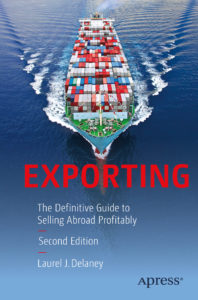
As UPS’s marketing director for small businesses, Jeremy Melis has his finger on the pulse of the global small business market. So you can imagine my excitement to connect with Jeremy to find out what he thinks are the latest trends in the small business sector, what scaling a business means and how technology has played a role in enabling small businesses and service providers to grow globally–fast.
Laurel Delaney: What is your role at UPS? How long have you been employed by the company? What’s changed the most dramatically in your industry over the last several years and how has UPS dealt with it?
Jeremy Melis: I joined UPS eight years ago and have most recently been focused on professional services and small business. We’ve seen some big changes among small businesses.
Technology is allowing small businesses to do more with less. Taking credit card payments with a cell phone is just one example that’s revolutionized how small retailers can quickly and efficiently conduct transactions.
The advancement of technology’s now spilled into the rise of online lenders such as Kabbage, which evaluate business loans according to criteria that’s different than traditional financial institutions.
We’ve also seen strong growth in cross-border e-commerce. Global trade is projected to increase 73 percent in the next 10 years (by 2025). There are tremendous opportunities for small businesses to prosper through global trade.
LD: There’s a lot of talk lately about scaling a business. Can you define what that means? Some people think of it as hiring the right people, whereas others might perceive it as finding customers.
JM: Scaling means something different to every business. Scaling can refer to more employees, new geography, more equipment or facilities, increasing the online presence or any combination of those things. The real question is, ‘Why are you in business in the first place?’ If scaling helps you achieve that, then you’re on the right path.
LD: Why is it important for a small business to scale? What’s the benefit or the endgame for a business owner? Does it help a company go global any faster had it not scaled?
JM: The goal isn’t necessarily the speed of domestic or international growth. The goal is to best position your business to achieve what you’ve defined as success. That could be revenue growth, geographic expansion, a community of loyal customers or a better quality of life for yourself and your employees.
LD: Does size matter for when or how a company scales its business? What if a company wants to stay small, should scalability be removed from its vocabulary?
JM: Technology allows companies of all sizes access to efficiencies that were previously only accessible to large enterprises. If you don’t take advantage of these efficiencies, you’re leaving money on the table—you could use those gains to grow or to comfortably stay small.
LD: What factors should small businesses consider before they attempt to scale their business? How do they assess and determine whether to own versus outsource their infrastructure?
JM: Ask yourself two questions:
- What is your core strength as a company and as an owner?
- What don’t you want to spend more time working on?
Smart scaling is when you allow yourself to maximize the former, and minimize the latter.
LD: How has technology (e.g., cloud computing, mobile apps and social media platforms) played a role in enabling small businesses and service providers to scale?
JM: I think about companies that leverage social media and crowdfunding to take their company from a dream to a million-dollar business before shipping their first product.
LD: Many business owners are reluctant to contact vendors directly because they don’t know where to go and/or they don’t want to be sold to. Does this approach help or hinder a business owner’s ability to scale a business?
JM: Nobody likes to be sold to, but everybody likes to be listened to. There are plenty of vendors that love doing the things that you hate. I’m reminded of Artaic, a Boston-based business that uses technology to make amazing custom mosaics. They want to be experts in mosaic design, not shipping. By leveraging services and advice provided by UPS, Artaic is able to focus on doing what they enjoy the most, which allows them to grow their business internationally.
LD: What’s one thing business owners aren’t doing that they should be doing relative to growing their businesses? Are relationships, peer networks and mentor important in the journey?
JM: Leverage peer networks and online resources to find trustworthy vendors to engage with. Take advantage of their experience and resources to help you set up scalable processes.
LD: In closing, what are your top three recommendations to business owners for scaling a business? Will this lead to a thriving and successful global business?
JM:
- Don’t try to take on too much too quickly.
- Be patient and strategic with your investments and expansions, or you can find yourself doing twice as much for the same return.
- Remember your passions and your goals, and why you’re doing this in the first place. Those guiding principles will provide clarity for the decisions you’ll have to make.
This article originally appeared at The Balance, formerly About.com Import/Export site, and is no longer available there. Laurel loves the interview so much that she decided to republish it here. We hope you find it useful to scaling your business globally. You might also find this presentation helpful to you for scaling your business.



 There are more than 8 billion potential customers in the world looking for your product or service. Are you ready to serve them?
There are more than 8 billion potential customers in the world looking for your product or service. Are you ready to serve them?